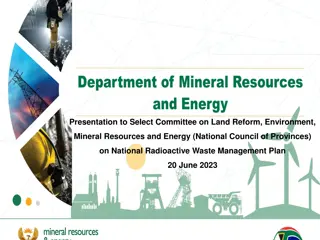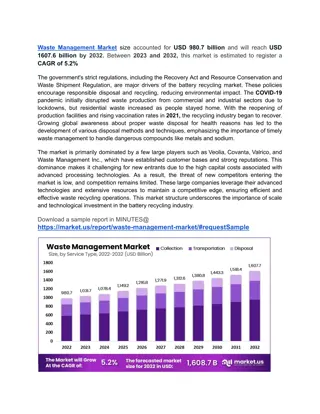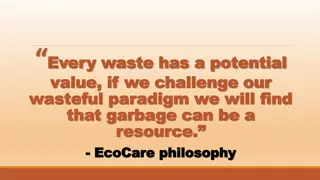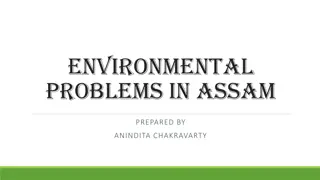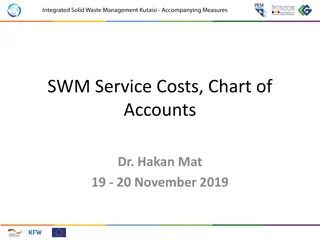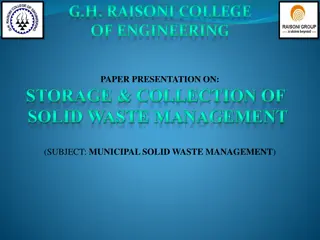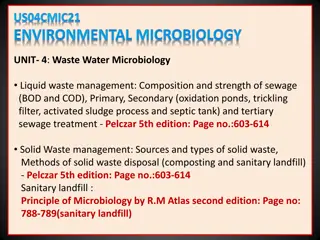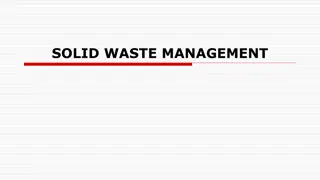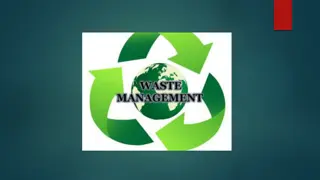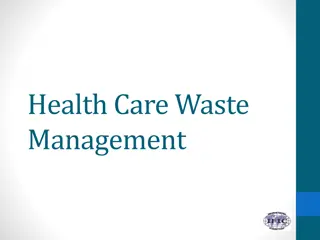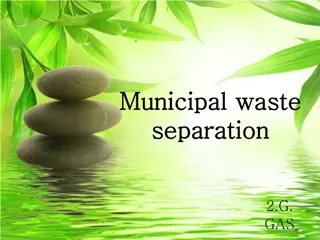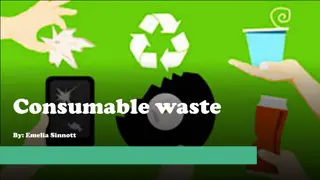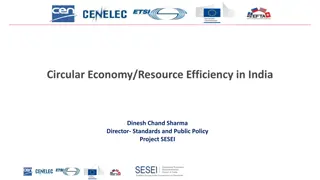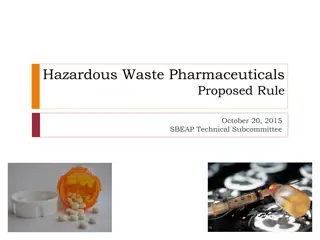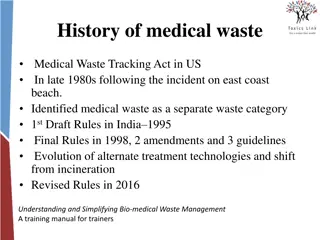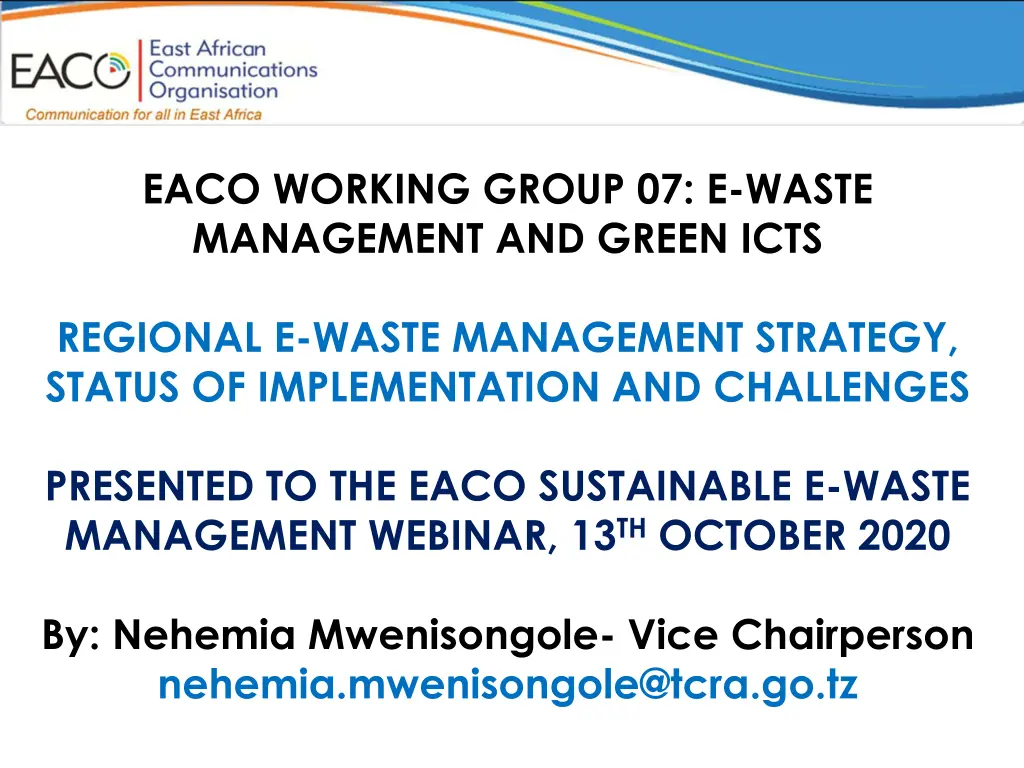
E-Waste Management Strategy in EAC Region: Implementation & Challenges
Explore the Regional E-Waste Management Strategy introduced in the East African Community (EAC) region, focusing on its status of implementation, challenges faced, and the way forward as outlined in the sustainable e-waste management webinar. Learn about the pillars of the strategy, the importance of policy frameworks, infrastructure development, resource mobilization, coordination, and capacity building. Discover the current status in Burundi, including the lack of developed policies and regulations, awareness workshops, and estimated e-waste figures.
Download Presentation

Please find below an Image/Link to download the presentation.
The content on the website is provided AS IS for your information and personal use only. It may not be sold, licensed, or shared on other websites without obtaining consent from the author. If you encounter any issues during the download, it is possible that the publisher has removed the file from their server.
You are allowed to download the files provided on this website for personal or commercial use, subject to the condition that they are used lawfully. All files are the property of their respective owners.
The content on the website is provided AS IS for your information and personal use only. It may not be sold, licensed, or shared on other websites without obtaining consent from the author.
E N D
Presentation Transcript
EACO WORKING GROUP 07: E-WASTE MANAGEMENT AND GREEN ICTS REGIONAL E-WASTE MANAGEMENT STRATEGY, STATUS OF IMPLEMENTATION AND CHALLENGES PRESENTED TO THE EACO SUSTAINABLE E-WASTE MANAGEMENT WEBINAR, 13THOCTOBER 2020 By: Nehemia Mwenisongole- Vice Chairperson nehemia.mwenisongole@tcra.go.tz
Content Introduction Regional E-Waste Management Strategy Status of Implementation Challenges Way Forward
Introduction This Working Group deals with activities related to E-waste Management and Green ICTs in the EAC region. Individual ICT regulators in the EAC region works very closely with E-waste stakeholders through E-waste National Steering Committees (NSCs). NSCs activities are reported to the EACO Regional Steering Committee (RSC) on E-waste Management which comprises representatives from NSCs and WG07
Regional E-Waste Management Strategy In 2017 the Regional Steering Committee (RSC) on E-waste Management Regional E-Waste Management Strategy The EACO Regional e-Waste Management Strategy is a five-year plan covering the period from 2017/18 to 2021/22 The Regional e-waste management strategy has been developed with the overarching goal of attaining a sustainable system in the EACO member states The strategy spells out management strategies actions to help to actualize them. developed the EACO e-waste management the priority with e-waste specific together
Regional E-Waste Management Strategy The strategy has five pillars:- Pillar1: Policy, Legal and Regulatory frameworks Pillar 2: Infrastructure for E-waste Management Pillar 3: Resource Mobilization
Regional E-Waste Management Strategy Pillar 4: Coordination and Institutional Alignment Pillar 5: Capacity Building, Research and M&E
Status of Implementation Burundi Policies and Regulations on e-waste management have not been developed yet. There is lack of estimation of e-waste on the market as from 2014. In 2016, the e-waste on the market was estimated at 20 tonnes, and 65 tonnes in the year 2019. E-waste awareness was regional awareness workshop held in Bujumbura in March 2019. Meetings for regional steering committee on e- waste management have never been convened. done during the 4th
Status of Implementation Kenya There is a National E-waste Management Strategy 2019 under the ministry of environment and forestry Draft Regulations on E-waste are undergoing discussions Drafted Extended Producer Responsibility Regulations in 2020 which are under discussion E-Waste guidelines are currently in use and they are implemented by National Environment Management Authority There are a few recycling firms which include; WEEE Centre, Sinoment, Sigmond, Enviroserve(Kenya), EWIK
Status of Implementation Rwanda E-waste survey was completed for the 5 years, another survey to be conducted soon E-waste awareness and capacity building has been done in one province and this will be done other provinces Regulations on e-waste are in place Licenses for transport and collection and dismantling are in place. There are 6 collection points for e-waste that have been launched in every district and at boarder points. Awareness to be done in each province commencing September 2020, though the process may be hampered by Covid 19 challenges. Some e-waste regulations are Presidential Order. pending for approval by the
Status of Implementation South Sudan A national steering committee to be constituted Stakeholders are in guidelines on e-waste management No policies or guidelines have been put in place to govern e-waste management in the country. consultation to formulate
Status of Implementation Tanzania Policy, Legal and regulatory frameworks on E-waste have been signed. TBS has developed Regional e- waste policy, guidelines, standards to act as model guiding national strategies. Requisite Infrastructure for E-waste Management has been accommodated in the National Bureau of Statistics Report on E-waste of 2019 Two E-Waste survey has finalised; By TCRA 2020 and NBS (1999 -2018) Country has a certified facility owned by a private entity (Chilambo) Resource mobilization environmental fund in place, (need confirmation from NEMC) laws, regulations and been conducted and Initiatives to establish
Status of Implementation Tanzania Institutional coordination and alignment; Strategy not yet developed however engaged in various seminars, trainings and workshops. Research, Monitoring and Evaluation and Capacity building; Higher Education institutions are considering to include e-waste management Database is in place at NEMC; Several Capacity building has been done for stakeholders. Stakeholders have been participating in various e-waste fora. EACO 5thRegional E-waste workshop on sustainable e- waste management scheduled for March 2020 in Dar es salaam was postponed due to Covid19 disease stakeholders have been in their curriculum;
Status of Implementation Uganda A national steering committee to be constituted. Stakeholders from national regulatory authority of ICT, national bureau environment, ministry of ICT, ministry of health, university of Juba and International partners are in consultation to formulate guidelines on e-waste management. No policies or guidelines have been put in place to govern e-waste management in the country. of statistics, ministry of
Challenges Member States face the following challenges in implementing the Strategy Lack of financial resources in implementing infrastructure for E-waste management Slow pace in reviewing the existing laws, regulations and guidelines to reflect the current environment .. .
Way Forward Based on the challenges faced in implementing the Strategy, the following is the way forward:- Considering implementing infrastructure for E-waste management on PPP basis .. .


